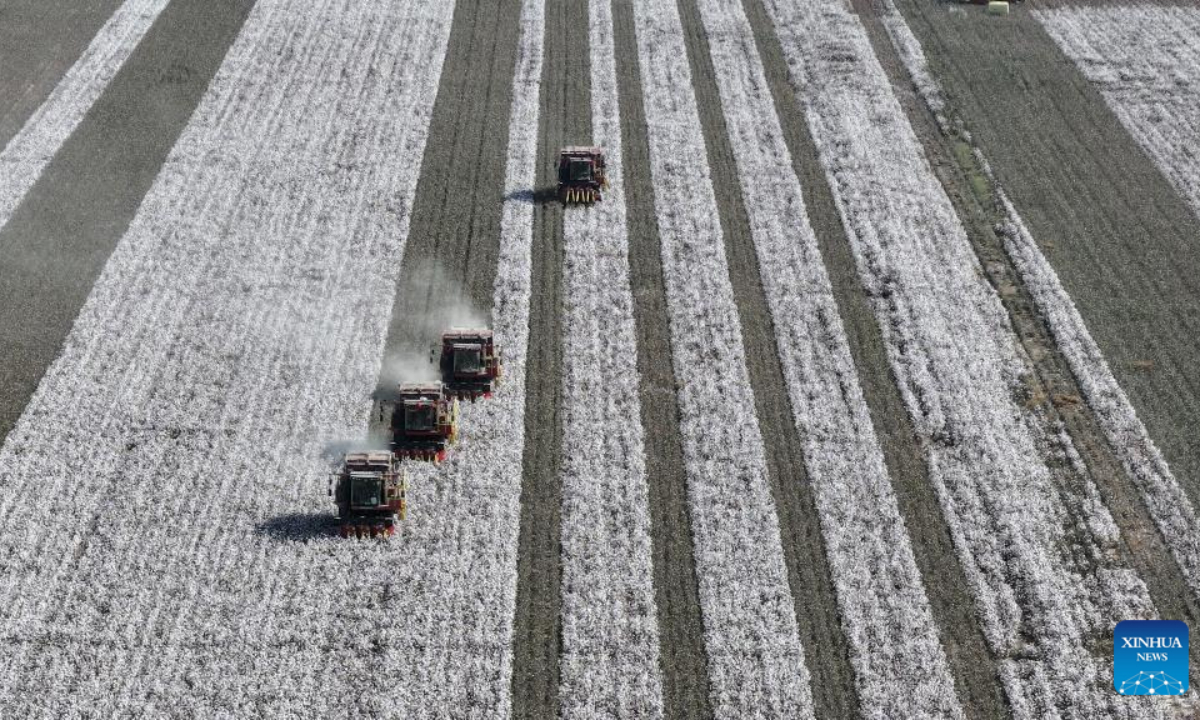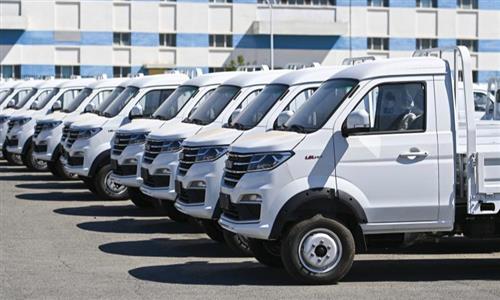Xinjiang Pilot FTZ officially established to make region a comprehensive logistics hub connecting Eurasia
Foreign-funded enterprises encouraged to invest in the region

This aerial photo taken on Oct 12, 2023 shows farmers harvesting cotton in Korla, northwest China's Xinjiang Uygur Autonomous Region. Photo:Xinhua
The China (Xinjiang) Pilot Free Trade Zone (FTZ) was officially established on Wednesday, becoming the first such zone in China's northwest border region and the 22nd pilot FTZ in the country.
The new pilot FTZ is expected to make Northwest China's Xinjiang Uygur Autonomous Region a model for promoting high-quality development in the central and western regions. Foreign-funded enterprises are encouraged to invest in the region, where they will have equal access to industrial and regional development policies.
The Ministry of Commerce (MOFCOM) said that it will support the Xinjiang pilot FTZ in attracting domestic and foreign resources, promoting investment facilitation, enhancing financial services, promoting the development of the digital economy and strengthening service guarantees for talent.
The Xinjiang FTZ will improve the service guarantee mechanism for foreign investment and support eligible foreign-funded enterprises in enjoying equal access to industrial and regional development policies, Guo Tingting, a vice minister of the MOFCOM, said at a press conference.
"Foreign financial institutions will be supported in setting up banking, insurance, securities and other financial institutions in the Xinjiang pilot FTZ to provide international and diversified financial products and services," said Guo.
Analysts said that the Xinjiang FTZ will offer investment opportunities for foreign-funded enterprises in China, as in the past decade, Xinjiang's overall construction situation lagged behind the domestic average, which means that there is huge space to make up for shortcomings.
According to a report by the China Council for the Promotion of International Trade released on Tuesday, more than half of the surveyed foreign-funded enterprises that intend to increase investment in China are considering to raise capital in the western region. The report on China's business environment in the third quarter of 2023 was based on surveys of more than 700 foreign-funded enterprises.
There is also large scope for infrastructure exchanges between Xinjiang and the five Central Asian countries. The MOFCOM said that infrastructure construction in the Xinjiang FTZ will be accelerated.
The Xinjiang FTZ will strengthen the construction of staging centers for the China-Europe Railway Express, and speed up the development of railway and highway multimodal transport among China, Kyrgyzstan and Uzbekistan.
The FTZ will also explore new ways to develop China-Pakistan multimodal transport cooperation, Li Xuan, a deputy head of Xinjiang's commerce department, said at the press conference.
Xinjiang has 18 national ports open to the outside world, 118 international road transport lines, 23 China-Europe (Central Asia) Railway Express routes, 33 international air routes, three West-East Gas Pipelines, 26 cross-border optical cables and two outbound electricity transmission channels.
The region has initially formed a "six-in-one" interconnected network of roads, railways, civil aviation, pipe networks, communications and power grids, said Li.
The construction of the Xinjiang FTZ should speed up the customs clearance time, and other support services will be more convenient, a Yiwu-based logistics agent surnamed Yu told the Global Times on Wednesday.
"We used to use the outbound China-Europe Railway Express routes that go through [North China's] Inner Mongolia Auton¬omous Region. Now we are considering using the outbound route through Xinjiang. After all, the Xinjiang route can pass through more countries and reach more destinations," said Yu.
The agent disclosed that the company's cargo transport service by truck goes through Xinjiang's Alashankou Port.
Analysts said that enhanced infrastructure connectivity will give full play to Xinjiang's geographic advantage to make it a key transportation, trade, logistics, culture, science and education center. Xinjiang is also a core area on the Silk Road Economic Belt, which is part of the China-proposed Belt and Road Initiative.
The construction of the Xinjiang FTZ is a natural development, Bai Ming, a deputy director of the international market research institute at the Chinese Academy of International Trade and Economic Cooperation, told the Global Times.
"Xinjiang is at the forefront of China's westward opening-up and a major node of the route of the China-Europe Railway Express. Xinjiang is also the province that has the largest number of neighboring countries," said Bai.
Bai noted that the construction of the FTZ can also benefit local industries.
According to the MOFCOM, the Xinjiang FTZ will vigorously develop the garment and other textile industries, and build a national high-quality cotton yarn production base. The FTZ will improve the standardization and scale of the processing industry for forest fruits, wine, dairy products and other specialty foods.
Many shares related to the Xinjiang region rose on Wednesday after the Xinjiang pilot FTZ plan was announced by the State Council on Tuesday night.

